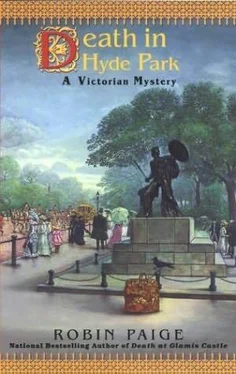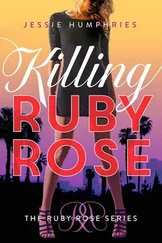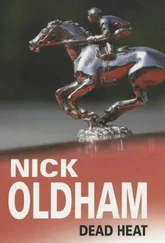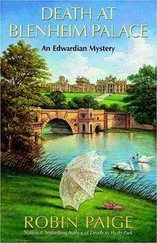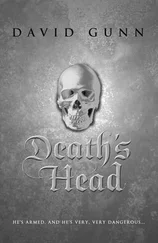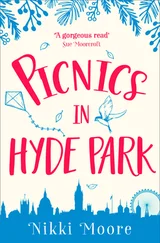Robin Paige - Death in Hyde Park
Здесь есть возможность читать онлайн «Robin Paige - Death in Hyde Park» весь текст электронной книги совершенно бесплатно (целиком полную версию без сокращений). В некоторых случаях можно слушать аудио, скачать через торрент в формате fb2 и присутствует краткое содержание. Жанр: Классический детектив, на английском языке. Описание произведения, (предисловие) а так же отзывы посетителей доступны на портале библиотеки ЛибКат.
- Название:Death in Hyde Park
- Автор:
- Жанр:
- Год:неизвестен
- ISBN:нет данных
- Рейтинг книги:5 / 5. Голосов: 1
-
Избранное:Добавить в избранное
- Отзывы:
-
Ваша оценка:
- 100
- 1
- 2
- 3
- 4
- 5
Death in Hyde Park: краткое содержание, описание и аннотация
Предлагаем к чтению аннотацию, описание, краткое содержание или предисловие (зависит от того, что написал сам автор книги «Death in Hyde Park»). Если вы не нашли необходимую информацию о книге — напишите в комментариях, мы постараемся отыскать её.
Death in Hyde Park — читать онлайн бесплатно полную книгу (весь текст) целиком
Ниже представлен текст книги, разбитый по страницам. Система сохранения места последней прочитанной страницы, позволяет с удобством читать онлайн бесплатно книгу «Death in Hyde Park», без необходимости каждый раз заново искать на чём Вы остановились. Поставьте закладку, и сможете в любой момент перейти на страницу, на которой закончили чтение.
Интервал:
Закладка:
Inspector Ashcraft shook his head.
Savidge looked up. “I didn’t quite hear you, Inspector. Could you repeat your answer?”
“No,” the inspector snapped, out of patience. “I did not handle any of the evidence.”
“Thank you,” Savidge said absently, moving his papers around again. “That will be all for the moment.” As the inspector stepped out of the box, Savidge added, “I reserve the right, however, to recall this witness.” He glanced at Sims. “If my esteemed friend has no objection.”
The prosecutor looked amused. “No objection at all,” he said in a supercilious tone, and called Detective Finney, who was sworn in. In a series of questions, Sims took the detective through the surveillance, the raid on the Clarion, and the subsequent searches of the living quarters of the men arrested at the newspaper, during which the bombs had been discovered, in each case hidden under the bed.
“And are these the bombs themselves?” the prosecutor inquired, gesturing at the three ginger-beer bottles he had placed in evidence as Exhibit B. The bottles, Kate saw, were quite ordinary stoneware bottles with what appeared to be screw-on caps. Kate saw that Charles was leaning forward, looking at them intently.
“Objection,” Savidge said. “My honorable friend has not yet demonstrated that these so-called bombs are anything other than what they appear to be-that is, ginger-beer bottles.”
“I will rephrase,” Sims said with an upward roll of his eyes. “You collected these three pieces of evidence in the rooms of the defendants, did you not?”
“I did,” Finney said.
“And did you assume, when you saw them, that they might… blow up?”
“Oh, yes, sir,” said Finney earnestly. “They could’ve contained shock-sensitive explosives, y’see. Nitroglycerine, maybe.”
“What did you do? I mean, how exactly did you handle these objects, which you assumed to be dangerous?”
“I labeled each bottle with the date and location. The bottle found in Mr. Mouffetard’s room is labeled one. That found in Mr. Kopinski’s room, two. In Mr. Gould’s flat, three. Mouffetard and Kopinski live in the same rooming house, in Halsey Street,” he added.
Sims indicated the bottles. “These are your labels?”
“Right, sir. Then I placed each bottle in a straw-lined crate and put the crate into a bomb box.”
“A bomb box?” the prosecutor asked, widening his eyes dramatically. “Please tell the jury what you mean by that term.”
“It’s a box made of special, heavy-duty metal, designed to contain a possible explosion. The boxes were transported to the Yard, where an expert chemist examined the bottles and their contents, which turned out to be-”
“Thank you,” Sims said, holding up his hand. “We’ll let the chemist tell us what he found.” He pointed to a stack of papers and several books. “This Anarchist literature, which I have entered as Exhibit C-you found it in Mr. Kopinski’s room?”
“Yes. The papers advertise an Anarchist meeting. The books are by Anarchists named Kropotkin and Bakunin.”
“Books advocating violence against the state?”
Finney nodded violently. “Oh, yes, indeed, sir. Very much so, sir.”
“And one more found object.” Sims pointed to another bottle. “Exhibit D. Please tell his lordship and the members of the jury what it is and where you found it.”
“Bottle of glycerine, sir. Doctor Gabriel’s Pure Medicinal Glycerine. I found it when I searched the newspaper office.”
“Thank you,” said Sims. “You may step down-unless, of course, my estimable friend Mr. Savidge has questions.”
“I suppose I may have one or two,” Savidge said, rising slowly. “Prior to the raid on the Clarion, the newspaper’s employees were followed. How long did you say you followed the suspects, Detective Finney?”
Finney thought. “For about a fortnight, I’d say.”
“A fortnight before the explosion in Hyde Park?”
“Yes. Maybe more.”
“So you were following these persons for a fortnight or more for no other reason than that they wished to exercise the right of the free press?” As he spoke, his voice rose. The last few words were spoken with a flinty emphasis.
Finney looked uncomfortable. “I wouldn’t put it that way.”
“I would,” Savidge said. “I certainly would. But never mind. Let’s talk about these three ginger-beer bottles that have been entered into evidence. Did either of the officers with you handle the bottles?”
“No, sir.” Finney squared his shoulders, assuming a brave look. “I was the only one. If something blew up, I didn’t want them to get hurt.”
“A commendable caution, I’m sure,” Savidge remarked in a dry tone. “You testified that you applied the labels to the bottles. Where did you do this?”
Detective Finney smiled. “Right on the side, sir.” The spectators tittered.
Savidge smiled. “Very good, Detective, very good, indeed. Where were you when you applied the labels?”
“In the defendants’ rooms, sir. I labeled ’em as I found ’em.”
“Thank you. You testified that you handled the bottles with care. How exactly did you handle them?”
Finney frowned. “Sir?”
“Did you pick them up by the base?” Savidge asked patiently. “By the neck? Did you cradle them in your hands? Did you wear gloves?”
“No gloves.” Finney’s grin was crooked. “But I was careful. Didn’t want to get blown to pieces, y’see.”
“I do see,” Savidge said. He turned away as if to sit down, and the detective, obviously relieved, took a step backward preparatory to leaving the box. The prosecutor opened his mouth to call the next witness, but Savidge turned quickly, catching them both off their guard.
“And how about fingerprints, Detective Finney? Since fingerprint evidence prevailed in this very courtroom only two days ago, we must not neglect it. I don’t suppose you made an effort to wipe the bottles clean of any fingerprints that may have been left by persons who handled them prior to your discovery?”
“Wipe them clean?” Finney darted a surprised look at the prosecutor. “No, I didn’t see any reason to-”
“Very good, Detective. Now, then, did you make any effort to refrain from leaving your fingerprints on the bottles?”
Kate noticed that the judge seemed to be listening with a greater interest.
Finney frowned. “Well, no. I had to put on the labels, y’see, which means that-”
“So we are likely to find your fingerprints on all three of these bottles?”
“I suppose,” Finney said, now quite clearly nettled. “But I don’t know what you’re-”
Sims had gotten to his feet. “I would like to ask my estimable friend what he-”
“Thank you, Detective,” Savidge said. “That will be all.”
The judge was leaning forward, a slight frown on his face. “Does counsel for the defense wish to explain to the jury what fingerprints are? I rather think that most of them are puzzled.”
“I do indeed, but not at the present time, may it please your lordship,” Savidge replied. “I expect to have occasion to do so later.”
“Very well.” The judge took out his gold watch and consulted. “Twenty minutes to the luncheon adjournment.” He peered down at the prosecution. “Mr. Sims? Will that be sufficient time to present your next witness?”
“I believe so, Your Honor,” Sims replied. With a sidelong glance at Savidge, he added, “Unless my honored colleague plans a lengthy cross-examination.”
Savidge smiled.
“We’ll risk it,” the judge said, and tapped his gavel. “Proceed, Mr. Sims.”
“Call Mr. George Baker,” the prosecution said.
Mr. George Baker, sworn, identified himself as a chemist employed by Scotland Yard to conduct routine chemical analyses. He had, he testified, analyzed the contents of three ginger-beer bottles brought to him by Detective Finney.
Читать дальшеИнтервал:
Закладка:
Похожие книги на «Death in Hyde Park»
Представляем Вашему вниманию похожие книги на «Death in Hyde Park» списком для выбора. Мы отобрали схожую по названию и смыслу литературу в надежде предоставить читателям больше вариантов отыскать новые, интересные, ещё непрочитанные произведения.
Обсуждение, отзывы о книге «Death in Hyde Park» и просто собственные мнения читателей. Оставьте ваши комментарии, напишите, что Вы думаете о произведении, его смысле или главных героях. Укажите что конкретно понравилось, а что нет, и почему Вы так считаете.
